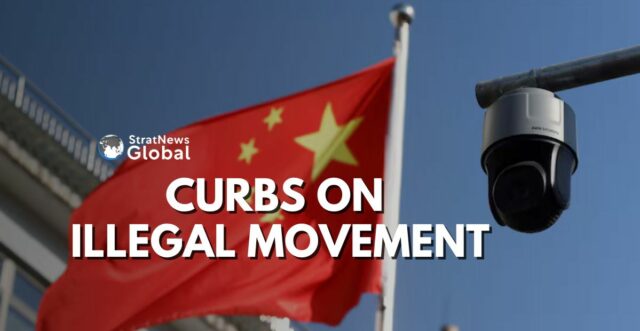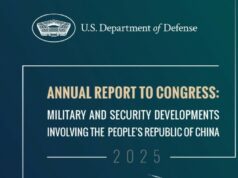Border police in China’s northeast have been given quotas to identify and expel undocumented migrants, a move that is making it harder for North Korean defectors to evade capture, according to previously undisclosed official documents and a dozen people familiar with the matter.
Implementation of New Measures To Curb Illegal Migration
China has implemented new deportation centres, hundreds of smart facial-recognition cameras and extra boat patrols along its 1,400-kilometre frontier with North Korea, according to publicly available government documents that outline spending on border surveillance and infrastructure.
In addition, Chinese police have begun to closely monitor the social media accounts of North Koreans in China, and collect their fingerprints, voice and facial data, four defectors and two missionaries told Reuters.
Stephen Kim, a missionary who helps North Koreans defect, told Reuters that based on his contacts with some 2,000 defectors, more than 90% of those currently in China had registered personal and biometric data with the police.
The measures took effect since the COVID-19 pandemic and have ramped up from 2023.
A Move To Manage Bilateral Ties
Cracking down on unauthorised migration helps Beijing manage a thorny issue in ties with Pyongyang while ensuring stability on China’s periphery, according to eight people, including security scholars, rights activists and a former North Korean official. It also gives China potential leverage over its neighbour because Beijing can control the fate of these undocumented North Koreans, several of them said.
“But primarily, China has feared that if too many North Koreans find refuge in China, more and more North Koreans would follow suit, and in time the outflow would destabilize North Korea and lead to reunification under South Korea and to the expansion of U.S. political and military influence on the peninsula,” said Roberta Cohen, a human rights specialist and a former U.S. deputy assistant secretary of state.
China’s National Immigration Administration, which is responsible for border police, and the Ministry of Public Security, which oversees the immigration agency, did not respond to queries about efforts to identify and deport North Koreans.
Beijing’s Foreign Ministry said China protected “the rights and interests of foreigners in China, while lawfully maintaining the order of border entries and exits”.
North Korea’s embassy in Beijing and its U.N. missions in Geneva and New York didn’t respond to questions about China’s handling of defectors.
While the documents don’t explicitly identify North Koreans as targets of the surveillance and deportations, the measures are focused on areas adjoining North Korea.
Little evidence of similar actions have been found at China’s other borders, except its porous frontier with Myanmar, where China has been tackling organised crime and recently opened a deportation centre.
In a statement, Myanmar’s government said 48,000 of its nationals were repatriated from China between 2022 and August 2024. Both countries collaborate on border management to ensure stability, it added.
Border Patrol
As per the 2024 budget for China’s border police in Jilin province, which adjoins North Korea, of 163 million yuan in spending, almost 30 million yuan went to border security upgrades. That included 22.3 million yuan for an unspecified number of new patrol boats, and funding for “deportation and repatriation” of foreigners that illegally enter, live and work in Jilin.
The budget set goals for 18 border police stations and teams: Investigate and “deal with” at least 10 undocumented foreigners; spend no more than 30 days to process each deportation; and remind residents of the “harm and price paid” for aiding undocumented migrants. It lists performance metrics, including 10 points for achieving a repatriation rate of 95%.
There were no such quotas in the 2023 and 2022 budgets.
Construction also began last year on a deportation station in the border city of Dandong, in Liaoning province, while another is planned for Changchun city, in Jilin, government tenders show.
A system funded by the 2023 border police budget will be installed at two crossings in the Changbai area, a common route for defectors. Additionally, a 7,713 square-metre deportation station in Tumen, completed in 2023.
Since June 2022, the National Immigration Administration has sought Korean-speaking graduates for roles at the Tumen and Changchun facilities, focusing on detaining illegal immigrants, verifying identities, and facilitating deportations.
Political Dynamics
Beijing denies that there are any North Korean defectors, instead treating them as illegal economic migrants. There is no publicly available data on deportations of North Koreans, but rights groups say the tighter surveillance has increased the risk of capture.
About 70% of defectors attempting to reach South Korea over the past two years have been arrested by Chinese police, up from around 20%, according to the Transitional Justice Working Group. China returned at least 60 North Koreans in April, as reported by executive director Lee Younghwan. Overall, the number of defectors reaching South Korea has declined since 2017 due to increased surveillance on the China-North Korea border, though there has been a rise since the end of the pandemic.
In a statement, South Korea’s Foreign Ministry said Seoul is making “all-out efforts” to prevent China from forcibly repatriating North Korean defectors.
Five security scholars told Reuters that while both sides wanted to stanch the flow of defectors, China’s ability to determine defectors’ destiny gave it a card to play in diplomacy with North Korea, which is reliant on trade with China but has been forging increasingly close ties with Russia.
A China expert at Asan Institute for Policy Studies in Seoul said that the crackdown helped Beijing from a stability standpoint, because North Korea was in economic turmoil and China did not want the effects of that spilling into its territory.
Lee Jung-hoon, an international relations professor at Yonsei University and a former South Korean ambassador-at-large for North Korean human rights, said there was a “high chance” that Pyongyang had asked China for help in blocking routes for defectors.
Increased Surveillance Raises Risks For North Koreans Who Fled To China
This isn’t the first time that China has cracked down on defectors. Reuters reported in 2019 that Chinese authorities had conducted raids that disrupted defector networks and resulted in the arrests of at least 30 North Koreans.
But some defectors say the heightened surveillance has intensified fear.
Choi Min-kyong, who reached South Korea in 2012 and runs a support group for defectors, said widespread facial-recognition technology in China made it difficult for defectors to move around. Using public transportation, for example, had become too risky.
Shin Ju-ye, who fled North Korea in the 1990s and settled in China’s Heilongjiang province, said that during the pandemic, village officials began ordering North Koreans to register their biometric information with the police. Many of her North Korean friends complied, then regretted it, she said.
Travelling in private vehicles, she escaped across the southern border to Vietnam, then ventured onward by bus, boat and on foot to reach Laos and Thailand, where she was handed to South Korean authorities. She arrived in South Korea in 2023.
($1 = 7.1095 Chinese yuan renminbi)
(With input from Reuters)





